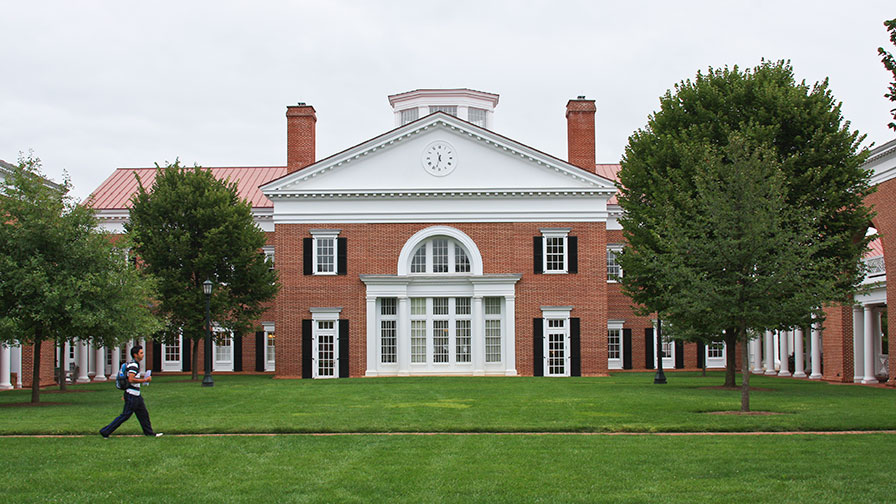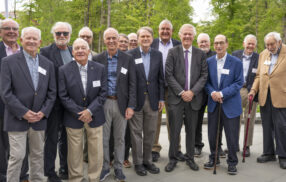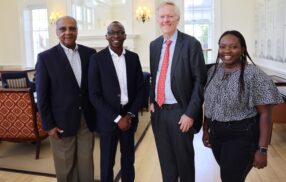
Darden School’s Global MBA for Executives Students View Business Through a European Lens in Paris and Berlin
New cases and learning experiences, the chance for faculty members to teach in teams, and an international, growing number of students made for an increasingly rich set of experiences for the second cohort in the University of Virginia Darden School of Business Global MBA for Executives (GEMBA) Class of 2014.
The GEMBA participants, 28 in all, are in their fourth quarter of the program, and recently returned from visits to Paris and Berlin. The cities served as backdrops for lessons in global marketing, cross-border mergers, and examinations of European banks navigating the Euro crisis and the new regulatory environment Basel III.
“Paris and Berlin are cities that many of us had been to previously, but under very different circumstances,” said Jordan Sorkin, Second Year GEMBA student. “Seldom have we traveled to Paris and learned how to value a European company with international business operations hedging against currency risk.”
It was this type of experiential learning and teaching that shaped the overwhelmingly positive experiences of both the students and faculty members who traveled with them.
Professors Yiorgos Allayannis, Lynn Isabella, Andy Wicks and Paul Farris led the cohort’s class sessions and case discussions. A visit from Darden’s Dean Bob Bruner also contributed to the dynamics of the participants’ experience.
“I think having Bob present this year was a nice addition. Not only did he attend classes, he interacted with the students. That seemed to be significant to them and a boost to the program,” said Wicks.
“We continued to push two key differentiators of the program. First, the integrative and cross-functional nature of a Darden program in which Darden faculty travel together with the students for the residencies, allowing for closer collaborations among faculty and deeper connections with students,” said Allayannis, who also serves as associate dean for GEMBA.
“The second distinct characteristic of the program is the link between the cases we teach and themes we cover in a residency with the visits we make and speakers we hear,” Allayannis added. “It is this coordination that allows for a deeper understanding of the issue such that the whole is bigger than the sum of the parts.”
LEARNING FROM THE CRÈME DE LA CRÈME
Sorkin described the last message Isabella shared with his cohort before they embarked upon their journey: “Push yourselves to explore a country that may potentially be more familiar to you than other countries we will and have visited. Do this by using a different lens than you may typically use and see what you can discover.”
Sorkin found out that there was much more to learn about business in Paris.
Isabella taught a case on Disneyland Paris, and then the group visited EuroDisney, where company leaders discussed a range of issues from finance to marketing. The students were challenged with the question of how to bring an iconic American brand to Europe and be successful.
“We learned about the costs of doing business in Europe as an American company with fierce competition. The speakers, of mixed nationality, allowed us to see the operating assumptions, actions and consequences of this extension of the Disney brand in a non-United States market,” Sorkin said. We looked at the park by the numbers, getting to pour over margins and expenditures with a vice president of finance standing by to frame decisions made about costs and financing. We also had a senior marketing executive on hand to talk through their segmentation strategy, retention rate and plans to increase attendance.”
The group then turned into cultural anthropologists, observing the differences between Euro, American and Tokyo Disney.
BANKING IN BERLIN
As fate would have it, the cohort arrived in Berlin on the eve of Germany’s political elections, which opened the door for deeper conversations about the economic environment in Europe.
“One of our speakers, a German economist, gave us a great overview of the European and German situation and where he saw Europe moving towards,” said Allayannis.
Another highlight for Allayannis — collaborating with his colleagues to teach a case — created a diverse exchange of ideas and perspectives.
“The banking case I taught with Andy, “Deutsche Bank and the Road to Base III”, brought up issues such as the global nature of banking, the intensity of global competition and the battle for value, market share and profitability. It also focused on the current realities of global regulation, corporate social responsibility and being a global German bank.”
INNOVATIVE TEACHING THROUGH TEAMWORK
“I believe the push for us to teach together and to make our teamwork more global in nature is stretching us in a good way, and making for a much richer learning experience for the students,” said Wicks, who joined forces with Isabella to try a different approach with an existing case.
The pair asked students to craft a two to three minute role-play depicting a supervisor and employee having either a successful conversation about the employee’s performance or an unsuccessful conversation. Half the class did the “successful” scenario; the other half did the “unsuccessful” scenario.
“The scenarios got a lot of powerful issues on the table and helped them to bond,” said Wicks.
Also, Farris and Wicks teamed up to teach a case that explored themes in marketing and ethics.
“Andy and I taught a case on a small firm entering a large retail market and facing the risk and cash flow effects of being asked to pay a quarter of a million dollars in ‘slotting allowances,’ which are fees paid to retailers to ensure shelf space in their stores,” said Farris. “The ethics of retailers charging for shelf space and questions about the limits of socially desirable product differentiation were integrated into the marketing management issues,” he added.
In January, the GEMBA Class of 2014 will go to India, where they will further their understanding of global business strategy, operations and decision analysis.
“Learning how to manage a tough conversation, writing a marketing plan, making an ethical decision and hedging currency risk are valuable skills to master independently, but getting to see where they converge in the executive suite in making difficult decisions is truly the output of a Darden global MBA,” said Sorkin.
The University of Virginia Darden School of Business prepares responsible global leaders through unparalleled transformational learning experiences. Darden’s graduate degree programs (MBA, MSBA and Ph.D.) and Executive Education & Lifelong Learning programs offered by the Darden School Foundation set the stage for a lifetime of career advancement and impact. Darden’s top-ranked faculty, renowned for teaching excellence, inspires and shapes modern business leadership worldwide through research, thought leadership and business publishing. Darden has Grounds in Charlottesville, Virginia, and the Washington, D.C., area and a global community that includes 18,000 alumni in 90 countries. Darden was established in 1955 at the University of Virginia, a top public university founded by Thomas Jefferson in 1819 in Charlottesville, Virginia.
Press Contact
Molly Mitchell
Associate Director of Content Marketing and Social Media
Darden School of Business
University of Virginia
MitchellM@darden.virginia.edu





